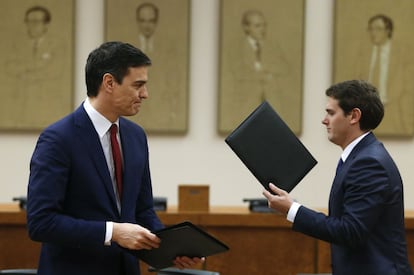The germ of a pact
The Socialists and Ciudadanos have come up with a modest governing plan, which is more than the other parties can say

The program announced on Wednesday by the Socialist Party (PSOE) and the center-right grouping Ciudadanos is vague and insufficient. It repeats too many times that certain issues will be studied or that such and such a promise, such as tax reform, will be carried out at a later date, making it too imprecise to be regarded as a genuine program for government. That said, it has the makings of a project, and as modest as it might appear, it is more than most of the other parties with a chance of governing have so far come up with.
Sadly, the document will most likely arouse confusion and reticence in Catalonia
The pact has surprisingly little to say about Catalonia – the most important problem Spain currently faces – other than rejecting outright a referendum on independence for the northeastern region. A clearer proposal might have been advisable in a pact between a party that until now has espoused a third way, involving an overhaul of Spain’s regional model, and another that is implacably opposed to the nationalist aspirations of some regions. Sadly, the document will most likely arouse confusion and reticence in Catalonia.
Similarly, it is unlikely that the pact’s promised reform of the judicial system will amount to much if it is limited simply to cutting the number of members of the General Council of the Judiciary (CGPJ) legal watchdog. The much-vaunted pledge to do away with another layer of administration by dismantling the central government’s provincial representatives has been reduced to vague references to councils of mayors; while Socialist leader Pedro Sánchez’s idea of overturning the Popular Party’s labor reform and security legislation sounds very different to Albert Rivera’s.
Many points require explanation, correction and more detail. That said, the pact shows a commitment to ending the stalemate of the last two months. Podemos has laid out its position much more clearly. For the moment, the PP has not yet been so explicit, which gives it the chance to consider it a bit more slowly before dismissing the proposals out of hand, a move that would not only assure a continued impasse, but also guarantee that it will not garner cross-party support should it decide to try to form a government on its own.
Spaniards voted for a change in direction of the country, and so far only the PSOE and Ciudadanos have made any effort to answer that call
When Spaniards voted in December, it was clear that they wanted a change in the direction of the country, and to a greater or lesser degree, so far only the Socialists and Ciudadanos have made any real effort to answer that call. But by themselves, they lack the numbers in Congress to form a government. If the other parties continue to block efforts to find a way forward, it is very likely Spaniards will find themselves voting again, on June 26, the outcome of which may well be a repeat of December’s.
Sánchez’s added problem is that he is hostage to promises he has already made. He told his party’s central committee that he would put any deal he made to the grassroots, and now it is laying out a question so vague that it seems more like a plebiscite on his leadership than a real vote on the agreement. At the same time, Rivera’s attempts to invoke the cross-party pacts of the late 1970s that helped pave the way for Spain’s transition to democracy after the death of General Franco are, needless to say, somewhat exaggerated.
Spain’s new generation of politicians needs to grow up; at the same time, the current impasse cannot go on forever, and political will is needed. At the very least, Pedro Sánchez and Albert Rivera have shown they possess it.
Tu suscripción se está usando en otro dispositivo
¿Quieres añadir otro usuario a tu suscripción?
Si continúas leyendo en este dispositivo, no se podrá leer en el otro.
FlechaTu suscripción se está usando en otro dispositivo y solo puedes acceder a EL PAÍS desde un dispositivo a la vez.
Si quieres compartir tu cuenta, cambia tu suscripción a la modalidad Premium, así podrás añadir otro usuario. Cada uno accederá con su propia cuenta de email, lo que os permitirá personalizar vuestra experiencia en EL PAÍS.
¿Tienes una suscripción de empresa? Accede aquí para contratar más cuentas.
En el caso de no saber quién está usando tu cuenta, te recomendamos cambiar tu contraseña aquí.
Si decides continuar compartiendo tu cuenta, este mensaje se mostrará en tu dispositivo y en el de la otra persona que está usando tu cuenta de forma indefinida, afectando a tu experiencia de lectura. Puedes consultar aquí los términos y condiciones de la suscripción digital.








































